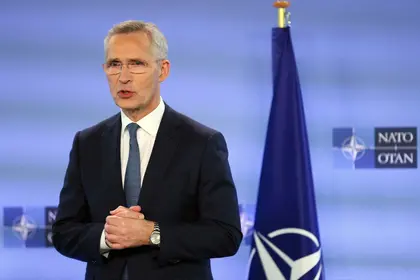NATO foreign ministers meet in Prague on Thursday in the face of growing calls for leading allies to lift restrictions stopping Kyiv from using Western weapons to strike inside Russia.
The two-day gathering in the Czech capital is meant to focus on efforts to hammer out a package of support for Ukraine at NATO's summit in Washington in July.
JOIN US ON TELEGRAM
Follow our coverage of the war on the @Kyivpost_official.
But the swirling debate over whether to let Kyiv use arms sent by Western backers to strike inside Russia risks overshadowing the meeting.
Ukraine has been pressing its supporters -- chiefly the United States -- to allow it to use the longer-range weaponry they supply to hit targets inside Russia.
The United States and Germany have so far refused to permit Kyiv to strike over the border out of fear that it could drag them closer to direct conflict with Moscow.
Ahead of the NATO meeting -- which starts with a dinner on Thursday -- alliance chief Jens Stoltenberg said repeatedly it was time for members to reconsider those limits as they hamper Kyiv's ability to defend itself.
French President Emmanuel Macron appeared to shift the dial on Tuesday when he said Ukraine should be allowed to "neutralize" bases in Russia used to launch strikes.
German chancellor Olaf Scholz, however, remained less committal, saying Ukraine should act within the law -- and Berlin had not supplied the weapons to hit Russia anyway.
Across the Atlantic, the White House said it still opposed Ukraine using US arms to strike inside Russia, although Secretary of State Antony Blinken hinted that that strategy could change.

Now It’s Time to Pull Together – Surely?
Moscow, meanwhile, has reacted strongly -- with President Vladimir Putin warning there would be "serious consequences" if Western countries give approval to Ukraine.
Those pressing for Ukraine to be given a freer rein say they hope momentum is building for the United States and others to change course as Kyiv struggles to stop Russia's offensive in the Kharkiv region.
"Clearly president Macron's ideas help allies who believe this rule should change," said a diplomat from one NATO country.
"I hope the debates in the US will take Macron's ideas into consideration."
- Washington package for Ukraine? -
As NATO allies wrestle with that issue, ministers in Prague are also trying to come up with a support package that keeps Ukraine satisfied as its hopes of eventual membership remain a distant prospect.
After pressing hard at a summit last year, Kyiv has been told firmly by NATO countries -- led by the United States and Germany -- that it should not expect any concrete progress towards joining the alliance in Washington.
NATO chief Stoltenberg instead wants to get alliance members to make clear, multi-year commitments on how much aid they'll give to Ukraine in the future.
Last month he floated an overall target figure of 100 billion euros ($108 billion) over five years, but that fell flat among allies confused over what it would involve.
"People understand you need to announce something, but they don't just want it to be air," the Western diplomat said.
Diplomats say debate is still ongoing as allies try to work out what any pledges would cover and how they might be structured.
One area where NATO does seem closer to agreement is a plan for the alliance to take over from the United States coordination of weapon supplies to Ukraine.
So far, Washington has been in charge as NATO has stayed clear of involvement in delivering arms due to worries it would incite Russia.
Proponents say making the alliance overall responsible could help insulate future deliveries against a possible return of Donald Trump to the US presidency.
But others fear it might just add more bureaucracy.
"The first hope is to not make it less effective than the current system," a second Western diplomat said.
Diplomats say that to avoid opposition from Hungary -- one of the friendliest countries to Russia in the alliance -- Budapest has been given an "opt-out" not to be involved.
You can also highlight the text and press Ctrl + Enter










